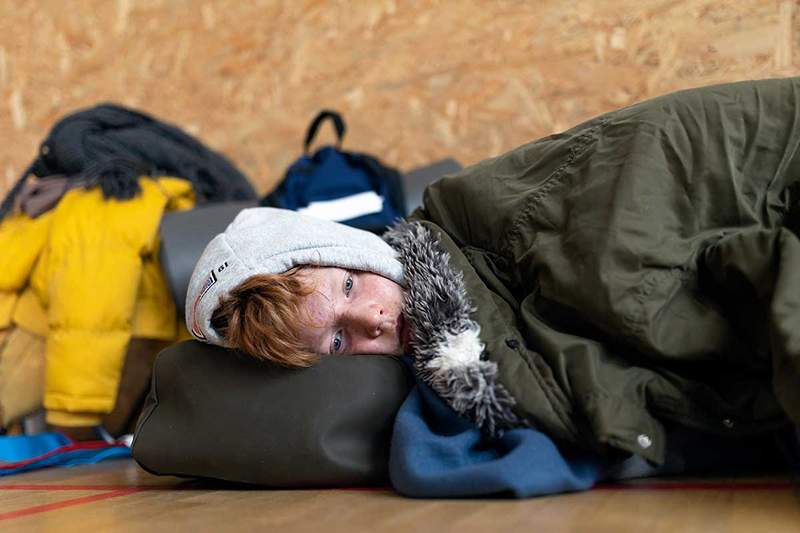How to explain to a child what a war is

- 3556
- 149
- Charles Fay
The war between Russia and Ukraine is a large event in current times. This is because the effects of a war conflict affect, in one way or another, the entire world population. Now, such a situation invades the media and we are constantly facing news on the subject.
For many, The constant news about war can become overwhelming, unleashing negative consequences at mental health level. In this thread of ideas, children are not left out of this phenomenon. Thus, it is very likely that the little ones will end up asking questions about the war. And, for adults, it will be essential to know how to answer their doubts rightly.
Content
Toggle- How the war news affects mental health
- How to talk to children about war
- 1. Inform
- 2. Avoid adopting a catastrophic posture
- 3. Allow the fluidity of thoughts and emotions
- 4. Encourage critical thinking
- What if I avoid having the conversation?
- References
How the war news affects mental health
Wars have a strong impact on politics and economy. Even so, it cannot be denied that people's mental health is also altered by this type of event. First, the media are responsible for showing images of death, disaster and suffering. Such a thing can generate in The most sensitive people a deep feeling of sadness.
What is a highly sensitive person? Main features
In addition, various fears may appear in the minds of people. For example, him Fear of losing freedom or anxiety generated by a possible decline in the economy. Taking these factors into account, inner peace is in danger when a war appears. Certain people experience insomnia, demotivation, and even suicidal thoughts. From this perspective, how could we expect a different response from children?
How to talk to children about war
Despite the above, there are certain strategies that we can take into account so that children can process this information in a healthy way.
1. Inform
If our goal is to transmit some type of information to the little ones, it is necessary that we inform ourselves on the subject. It is important that we are aware of What is war, what are its causes and consequences. Also, it would be of great relevance to know if there is any positive aspect about war, although at the outset it does not seem like it, because these are usually advances of progress and revolutions.
Thus, investigate through different sources will allow us to have a broader posture when explaining. So, we will see each other in the ability to respond to all the doubts that may arise in the curiosity of infants.
2. Avoid adopting a catastrophic posture
According to Albert Bandura's social learning theory, a means of learning for children is imitation. Thus, Parents end up being a reference of behavior that children could copy as an example. Thus, if parents demonstrate excessive anxiety or fear about war, it is expected that the little ones do the same.
Catastrophic thinking always implies imagining the worst scenarios, drowning in a glass of water and magnifying events. To the war conflict you have to give its deserved importance, however, It is not worth exaggerating when it comes to thinking about its possible effects. Avoiding catastrophic thinking will help children to understand what is happening without experiencing insomnia, anxiety or depression.
3. Allow the fluidity of thoughts and emotions
The free expression of emotions is key to the development of emotional intelligence. For this reason, we must listen closely what kind of thoughts and emotions encourages the issue of war in children. So, Avoid talking about feelings will not make them fade. On the contrary, they will be repressed and They could express themselves in little suitable ways, like tantrums or involuntary urination. As if that were not enough, preventing infants from communicating what they feel can make them think that their emotionality is unimportant, directly affecting their self -esteem.
How to teach children to recognize their emotions
4. Encourage critical thinking
Critical thinking is A process in which the statements of everyday life are not automatically accepted as true, but are questioned. It is a skill that leads human beings to develop more reasonable positions and make accurate decisions. Talking with children about war is an excellent opportunity to encourage critical thinking.
The Shared reflection, The debate or the exchange of ideas are tools that will help the little ones to have their own criteria about the war. Therefore, encourage them to think about possible solutions and alternatives to the war conflict, in addition to encouraging them to question themselves. These actions will be valuable so that the information presented in the media does not affect them negatively.
 Hemophobia or fear of blood: 3 causes
Hemophobia or fear of blood: 3 causes What if I avoid having the conversation?
Many times, when we find a situation of difficult coping, we see you in the attempt to avoid it. This constitutes A defense mechanism that allows us to flee momentarily from this event that causes us discomfort. However, we will eventually have to face, because although we avoid talking about war, at some point children will ask a question about it. Thus, the most advisable is be prepared for conversation, And if possible, get ahead of your questions.
References
- Bandura, a.(1987). Social Learning Theory. Espasa-Calpe.
- Beck, a. (1983). Cognitive Depression Therapy. Brouwer falls out.
- Paoli, g., Cubí del Amo, P. How Ukrainia War affects our mental health. Extracted from: https: // www.Sabervivirtv.com/actual/as-affects-war-ornia-salud-method_6957
- Soler, j., Aparicio, l., Díaz, o. and others. (2016). Emotional intelligence and well -being. San Jorge University Editions.
- « Origin of the 5 great personality or Big Five features
- Catastrophization of pain, what is exactly »

